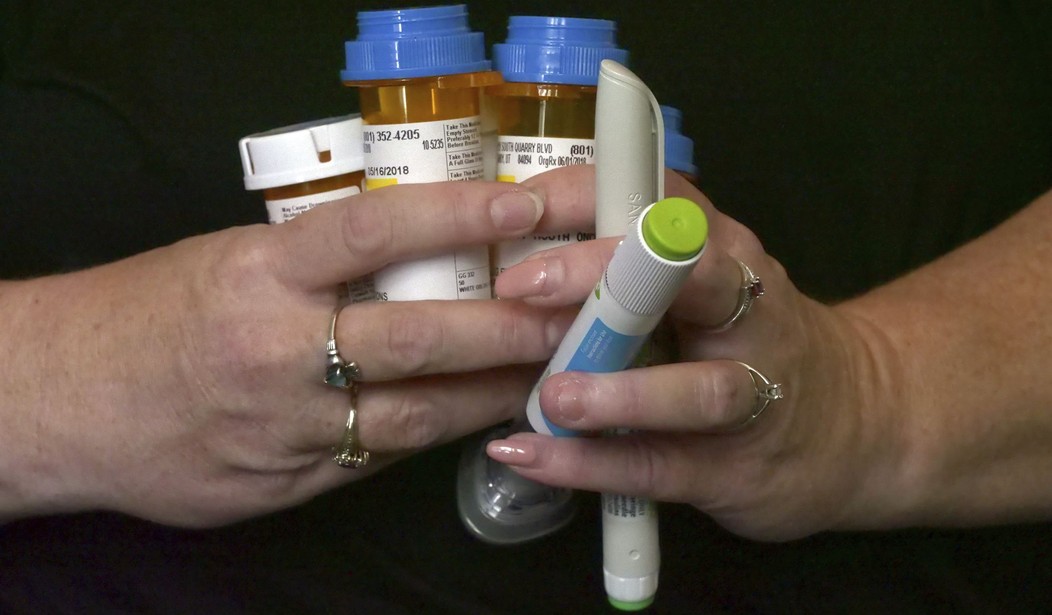A Seattle patient just became the first American to receive a potential breakthrough vaccine for COVID-19. That vaccine -- developed by Moderna, a Massachusetts biotech start-up -- is one of several experimental coronavirus vaccines and treatments that pharmaceutical firms are developing around the country.
The industry's lightning-fast reaction is a testament to the ingenuity of America's scientists -- and the dynamism of America's drug-development system. And it's a reminder that Washington's ongoing effort to defund pharmaceutical innovation puts millions of lives at risk.
To say that drug firms have moved quickly to combat this pandemic is an understatement. In the nearly three months since the first case of COVID-19 made headlines, drug companies across the country have snapped into action.
Many companies have promising therapies in the pipeline. In addition to Moderna, Pennsylvania-based Inovio and Johnson & Johnson have potential vaccines. Remdesivir, an antiviral from Gilead Sciences that has shown promise against the novel coronavirus, has undergone multiple clinical trials. AbbVie, an Illinois life sciences company, is investigating whether its HIV medication Kaletra can be used to treat COVID-19. Another U.S. firm, Thermo Fisher, just won approval for a new COVID-19 test -- a development that could vastly improve detection efforts across the country.
While impressive, the breakneck response of American research firms isn't completely surprising. After all, America does pharmaceutical innovation better than any other country.
The United States develops two-thirds of the world's new drugs. In the last ten years, American drug firms have spent over half a trillion dollars on research and development -- more than the private investments of all other countries combined.
Our unrivaled research infrastructure naturally puts the American pharmaceutical sector in the best position to address an emergency like COVID-19, which demands high-quality drug-development in a hurry.
Americans should be proud of our nation's prowess in life-sciences research. Yet, for the past several years, many in Washington have sought to destroy the market incentives that undergird the country's drug-innovation ecosystem.
A bill introduced last year by Senators Chuck Grassley (R-Iowa) and Ron Wyden (D-Oregon), for instance, would fine drug companies that increase the price of certain drugs covered by Medicare Part D faster than the rate of inflation.
Similarly, H.R.3 -- a sweeping prescription drug bill recently approved by the House -- would effectively cap the price Medicare pays for particular drugs at 120 percent of the price paid in six reference countries.
Both policies amount to government-imposed price controls -- precisely the sorts of market interventions that have hamstrung drug development in places like Germany, France, and the United Kingdom.
Before the widespread adoption of price controls, Europe was a drug development juggernaut. In the 1970s, those three countries alone combined to produce 45 percent of new therapies invented worldwide. From 2001 to 2010, they produced just 20 percent. Our country develops the most new drugs today because we maintained a free market for prescription medicines.
Companies undertake tremendous risk when developing drugs. On average, developing just one medicine takes more than a decade and costs over $2.5 billion after accounting for all of the medicines that don't pan out.
Investors will tolerate that risk because, in the United States, drug companies can sell their products at a fair market price. This means that a successful drug has the opportunity to break even, and sometimes turn a profit.
But the economic logic of drug development vanishes if the government can simply dictate whatever price it deems appropriate.
If any of the price-control reforms on the table took effect, private investment in medical research would quickly flee to less risky ventures. From there, it wouldn't take long for the world's most powerful engine of drug discovery to break down.
A collapse in medical innovation would be harmful in the best of times. But during a global-health emergency like the COVID-19 pandemic -- a moment that demands the full force of America's biotech ingenuity -- it would be nothing short of calamitous.
Stacy Washington is a decorated Air Force Veteran, an Emmy nominated TV personality, and the host of the nationally syndicated radio program "Stacy on the Right."
Coronavirus Reveals the Recklessness of Drug Pricing Reform
The opinions expressed by columnists are their own and do not necessarily represent the views of Townhall.com.

Advertisement
Recommended
Trending on Townhall Videos
Advertisement
Advertisement
Advertisement
























Join the conversation as a VIP Member